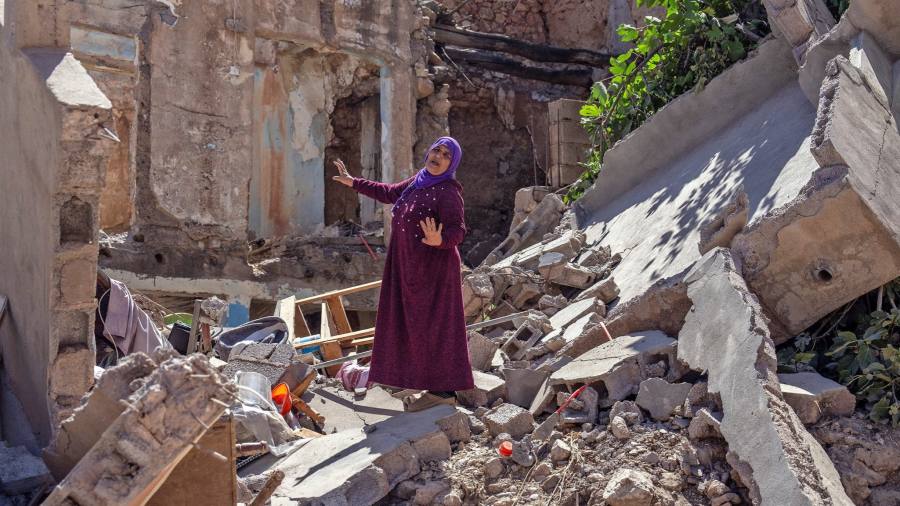Receive free Morocco updates
We’ll send you a myFT Daily Digest email rounding up the latest Morocco news every morning.
Rescuers combed through collapsed buildings in mountain villages in Morocco’s High Atlas region on Sunday as they searched for survivors of an earthquake that has killed more than 2,000 people.
Aid workers said the next two days would be critical after the 6.8 magnitude quake struck on Friday night, damaging parts of the ancient city of Marrakech and devastating villages in a mountainous region of the kingdom.
Many houses in rural areas are built in the traditional adobe style of dry mud and could not withstand the most powerful quake to hit the north African kingdom in 120 years.
“The priority is to try to reach those under the rubble who we know to be still alive,” said Caroline Holt, head of operations at the International Federation of Red Cross and Red Crescent Societies. “The next 24 to 48 hours will be critical in terms of saving lives. Search and rescue efforts will be prioritised in parallel, of course, with making sure that those that we know have survived are taken care of.”
Holt added that the death toll — which stood at 2,012 on Sunday — was expected to rise because rescuers were struggling to reach remote villages as mountain roads had been blocked by rockfalls triggered by the quake.
“We assume these places have suffered because they are in the epicentre,” she said. “You have a 6.8 magnitude earthquake at a very shallow depth and these are the most dangerous.”
The epicentre was about 72km south-west of Marrakech, which is Morocco’s top tourist destination.
Across the affected area, including Marrakech, people slept in the open for fear of aftershocks. Some were afraid to return to houses that were still standing but had been damaged or cracked by the tremor and could collapse.
Mokhfi Abdul Jalil, a Marrakech resident, described how he rushed back to his house after the quake struck. He found the roof had fallen on to his car and destroyed it. “This has happened to me and two of my neighbours. Since then we have been camping out in a public garden.”
Alice Morrison, a writer who lives in the High Atlas village of Imlil, 67 kms from Marrakech, said she and her neighbours spent the night in tents in a car park. Only one person in the village was killed, but many houses were damaged and the electricity supply had been cut.
“I think that everything that has been cracked will fall down and that is what I personally fear. One of the small shops in our village has been cut in half,” Morrison said. “What we observed is that most of the houses built of clay have been badly affected, but concrete ones have not been so badly damaged.”
In a neighbouring village, a family of five were killed when their house collapsed, she added.
Morrison described huge boulders “the size of a lorry” preventing access by cars to the village.
“I went on a 16 kilometre bike ride, and I saw destroyed villages on both sides of the road,” she said. “What worries me is the situation in the tiny villages that you can only reach by foot or by mule further up the mountain and in the next valley. We saw a government helicopter so maybe they are doing reconnaissance.”
King Mohammed VI, Morocco’s ruler instructed senior officials on Saturday to set up a committee tasked with emergency reconstruction and rehabilitation of damaged homes, and to provide aid and shelter to survivors. He also decreed three days of national mourning.
Large quakes are rare in Morocco, but in 1960 more than 12,000 people were killed by a 5.8 magnitude earthquake that struck Agadir in the country’s western coastal region.
The IFRC has already disbursed SFr1mn ($1.12mn) to the Moroccan Red Crescent so that work could get under way immediately to support survivors, help the hundreds of people injured and provide basic food and clean water to survivors, said Holt.
The organisation said it would take “months if not years of response” to deal with the impact of the tremor on the lives of those who have lost homes and loved ones.
Morocco has received offers of support and specialised rescue teams from France, Israel, Tunisia, Spain, Kuwait, Turkey and Taiwan.
Even regional rival Algeria, which broke off ties with Rabat two years ago, has said it was ready to provide humanitarian support if requested by Morocco. It said it was also prepared to open its airspace, now closed to Moroccan planes, for humanitarian and medical flights.
Before the quake, Moroccan tourism was on track to have its best year on record with 14mn visitors expected by the end of 2023, but authorities will be concerned the earthquake will put off visitors.
James Wix, director of Le Farnatchi hotel in Marrakech, said the damage in the city “is less than first feared”, but added that news of the earthquake had already spurred booking cancellations.
He said he has been told the government would dispatch engineers to test the structural soundness of buildings hosting tourists. Wix added that while there was damage to some buildings in Marrakech’s old city, it was not in a “desperate situation”.
“The infrastructure is good,” he said. “We have good electricity and the phones are working,” Wix said. “So when the dust settles, hotels will still be open, the gardens will be there and the beautiful monuments will still be standing and there to be photographed.”
Additional reporting by Samir Daoudi in Marrakech
Read the full article here




